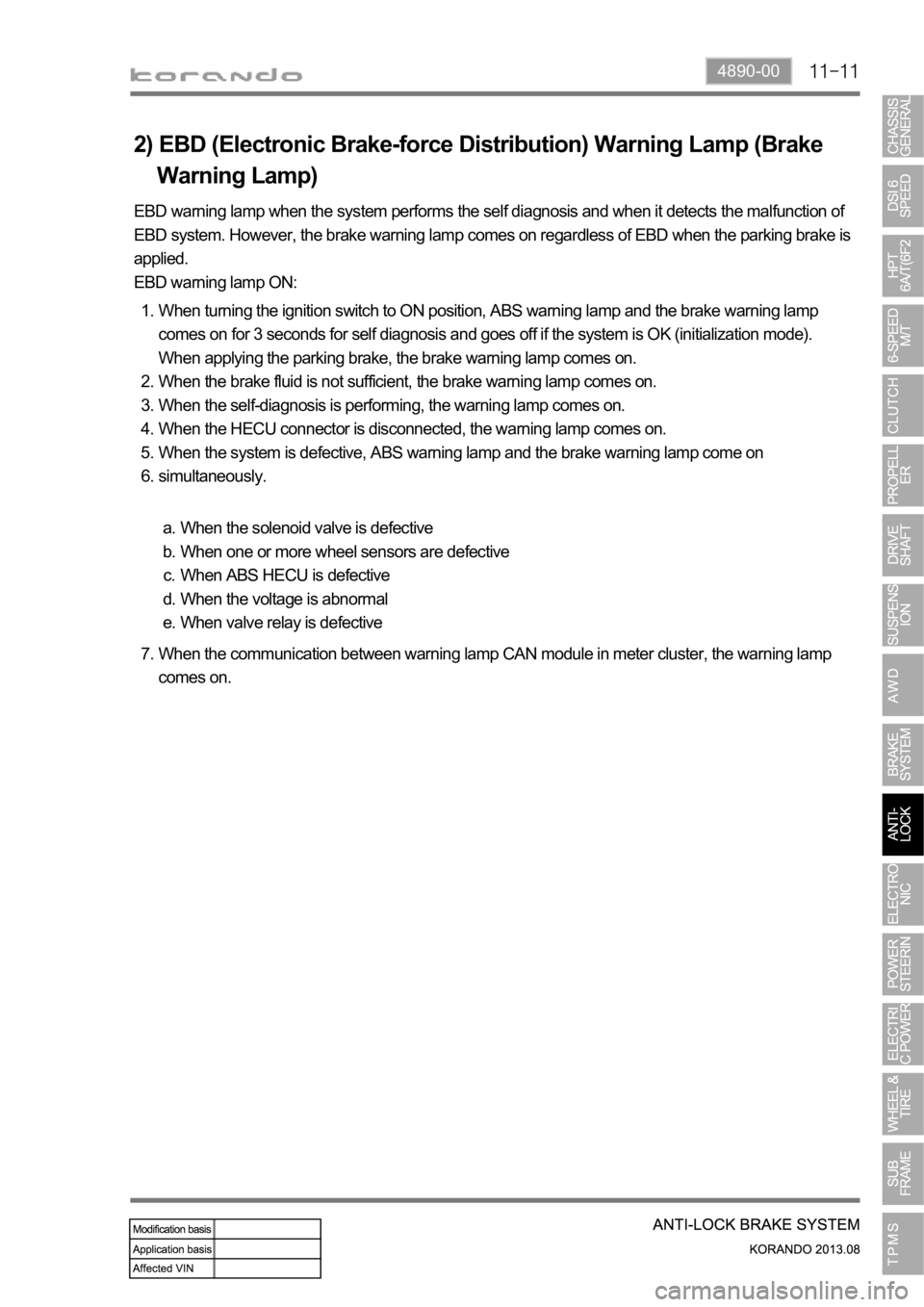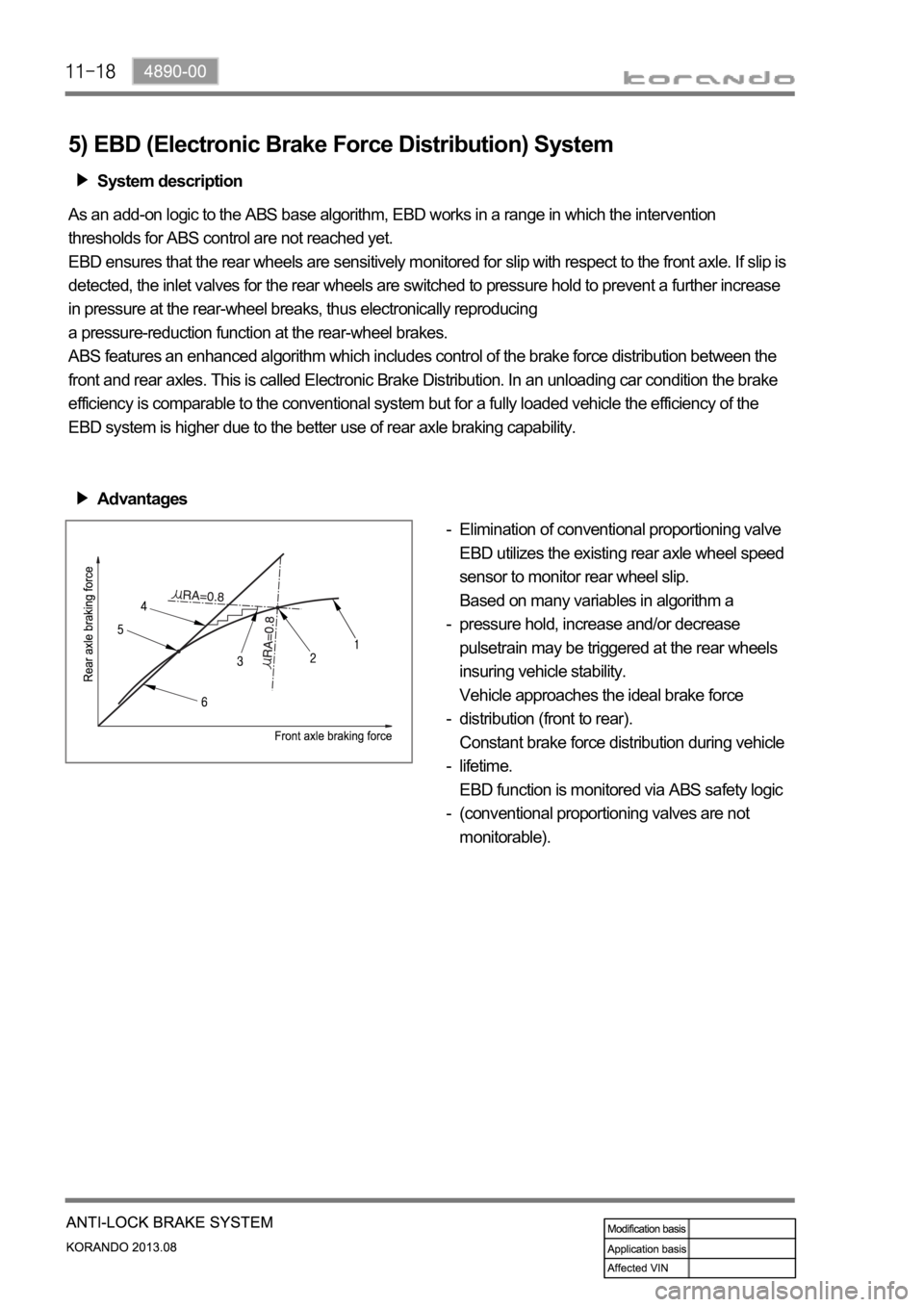Page 1104 of 1336
G-sensor (only for 4WD)
For the vehicle with the ABS, a speed difference
between the wheels is not noticeable as all the
wheels are slipping during abrupt braking.
Therefore, the vehicle needs the speed
information from other sensors other than the
wheel speed sensor. On the 2WD vehicle, there
is not large difference between the vehicle speed
reduction and actual wheel speed reduction in
the event of braking since the driving wheels are
in the front. So, the ABS HECU can control the
vehicle, based on a calculation value. But, on the
4WD vehicle, if a speed reduction occurs in the
front or rear of the vehicle, it affects the other side
wheel. In other words, braking the rear wheels
induces also a large speed reduction in the front
wheels. The longitudinal acceleration sensor is
used for this case. It controls the ABS by using
the signals from the sensor during abrupt braking
and acceleration.
G-sensor
Page 1105 of 1336
4890-00
3. ABS CONTROL LOGIC
The principal ABS control logic is the determination of the reference speed by choosing one wheel
meeting a certain condition, while sensing the speed information from 4 wheel speed sensors when the
vehicle is being driven.
For example, when the comparison of the reference speed with front right wheel speed shows a slip, the
control signal is determined according to whether it's deceleration or acceleration. If the control
conditions are met, the brake for the front right wheel will be got under control.
Page 1107 of 1336

4890-00
2) EBD (Electronic Brake-force Distribution) Warning Lamp (Brake
Warning Lamp)
EBD warning lamp when the system performs the self diagnosis and when it detects the malfunction of
EBD system. However, the brake warning lamp comes on regardless of EBD when the parking brake is
applied.
EBD warning lamp ON:
When turning the ignition switch to ON position, ABS warning lamp and the brake warning lamp
comes on for 3 seconds for self diagnosis and goes off if the system is OK (initialization mode).
When applying the parking brake, the brake warning lamp comes on.
When the brake fluid is not sufficient, the brake warning lamp comes on.
When the self-diagnosis is performing, the warning lamp comes on.
When the HECU connector is disconnected, the warning lamp comes on.
When the system is defective, ABS warning lamp and the brake warning lamp come on
simultaneously. 1.
2.
3.
4.
5.
6.
When the solenoid valve is defective
When one or more wheel sensors are defective
When ABS HECU is defective
When the voltage is abnormal
When valve relay is defective a.
b.
c.
d.
e.
When the communication between warning lamp CAN module in meter cluster, the warning lamp
comes on. 7.
Page 1112 of 1336
3) Basic ABS Control
Operation of ABS control unit
Applications of the ABS control unit The signals
produced by the wheel sensors are evaluated in
the electronic control unit. From the information
received, the control unit must first compute the
following variables:
Wheel speed
Reference speed
Deceleration
Slip -
-
-
-
Reference speed
The reference speed is the mean, I.e. average speed of all wheel speeds determined by simple
approximation.
Simplified ABS control
If, during braking, one wheel speed deviates from the reference speed, the ABS control unit attempts to
correct that wheel speed by modulating the brake pressure until it again matches the reference speed.
When all four wheels tend to lock, all four wheels speeds suddenly deviate from the previously
determined reference speed. In that case, the control cycle is initiated again in order to again correct the
wheel speed by modulating the brake pressure.
Page 1114 of 1336

5) EBD (Electronic Brake Force Distribution) System
System description
As an add-on logic to the ABS base algorithm, EBD works in a range in which the intervention
thresholds for ABS control are not reached yet.
EBD ensures that the rear wheels are sensitively monitored for slip with respect to the front axle. If slip is
detected, the inlet valves for the rear wheels are switched to pressure hold to prevent a further increase
in pressure at the rear-wheel breaks, thus electronically reproducing
a pressure-reduction function at the rear-wheel brakes.
ABS features an enhanced algorithm which includes control of the brake force distribution between the
front and rear axles. This is called Electronic Brake Distribution. In an unloading car condition the brake
efficiency is comparable to the conventional system but for a fully loaded vehicle the efficiency of the
EBD system is higher due to the better use of rear axle braking capability.
Advantages
Elimination of conventional proportioning valve
EBD utilizes the existing rear axle wheel speed
sensor to monitor rear wheel slip.
Based on many variables in algorithm a
pressure hold, increase and/or decrease
pulsetrain may be triggered at the rear wheels
insuring vehicle stability.
Vehicle approaches the ideal brake force
distribution (front to rear).
Constant brake force distribution during vehicle
lifetime.
EBD function is monitored via ABS safety logic
(conventional proportioning valves are not
monitorable). -
-
-
-
-
Page 1120 of 1336
0000-00
1. SPECIFICATION
1) Specification of Active Wheel Sensor
Description Specification
Supplying voltage DC 12 V
Output current (at 2.75 km/h of vehicle speed) 7 mA (Lo) ~ 14 mA (Hi) +20%/-16%
Tightening torque Front: 7.8 to 11.8 Nm
Rear: 7.8 to 11.8 Nm
Operating temperature
Operating frequency 1 ~ 2,500 Hz
UnitDescription
ABS ESP
HECU Clock frequency: 32 MHz Clock frequency: 50 MHz
Memory: 128 KB Memory: 512 KB
Switch orifice Switch orifice
Wheel speed sensor Active type Active type
Steering wheel angle
sensorNone Max. detection angle speed:
Operating voltage: 9 to 12 V
Sensor cluster None Yaw rate sensor + lateral G sensor +
longitudinal G sensor (4WD)
Longitudinal G sensor 4WD only None
Pressure sensor None HECU integrated
Page 1121 of 1336
2) Specification of Steering Wheel Angle Sensor
Description Specification
Operating voltage 9 to 16 V
Maximum output current 10 mA
Maximum detection angle speed
Operating temperature
Supplying voltage 9 to 16 V (battery voltage)
Output voltage (HI) approx. 3.50 V (3.0 to 4.1 V)
Output voltage (LO) approx. 1.50 V (1.3 to 2.0 V)
Pulses/rev 45 pulses/rev
3) Specification of Sensor Cluster
Description Specification
Supplying voltage approx. 12 V (8 to 16 V)
Current consumption below 250 mA -
Operating range Yaw rate sensor
Lateral/longitudinal sensor
Page 1122 of 1336
0000-00
1. OVERVIEW
The ESP (Electronic Stability Program) has been developed to help a driver avoid danger of losing
control of the vehicle stability due to understeer or oversteer during cornering. The yaw rate sensor,
lateral sensor and longitudinal sensor in the sensor cluster and the steering wheel angle sensor under
the steering column detect the vehicle conditions when the inner or outer wheels are spinning during
oversteer, understeer or cornering. The ESP ECU controls against oversteer or understeer during
cornering by controlling the vehicle stability using input values from these sensors and applying the
braking force to the corresponding wheels independently. The system also controls the engine power
right before the wheel spin synchronized to decelerate the vehicle automatically in order to maintain the
vehicle stable during cornering.